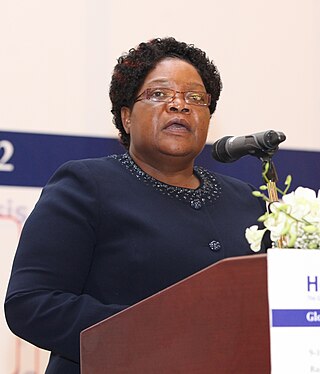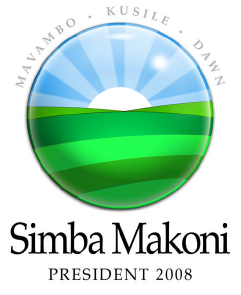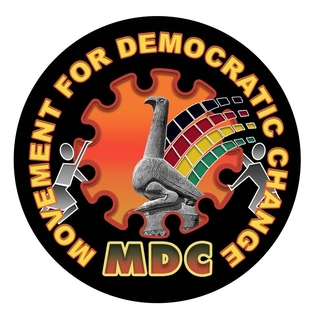Related Research Articles

The Zimbabwe African National Union – Patriotic Front (ZANU–PF) is a political organisation which has been the ruling party of Zimbabwe since independence in 1980. The party was led for many years under Robert Mugabe, first as prime minister with the Zimbabwe African National Union (ZANU) and then as president from 1987 after the merger with the Zimbabwe African People's Union (ZAPU) and retaining the name ZANU–PF, until 2017, when he was removed as leader.

Joice Runaida Mujuru, also known by her nom-de-guerre Teurai Ropa Nhongo, is a Zimbabwean revolutionary and politician who served as Vice-President of Zimbabwe from 2004 to 2014. Previously she had served as a government minister. She also served as Vice-President of ZANU–PF. She was married to Solomon Mujuru until his death in 2011 and was long considered a potential successor to President Robert Mugabe, but in 2014 she was denounced for allegedly plotting against Mugabe. As a result of the accusations against her, Mujuru lost both her post as Vice-President and her position in the party leadership. She was expelled from the party a few months later, after which she formed the new Zimbabwe People First party.

Arthur Guseni Oliver Mutambara is a Zimbabwean politician. He became the president of the Movement for Democratic Change (MDC) in February 2006. He has worked as a director and CEO of Africa Technology and Business Institute since September 2003. Under a September 2008 power-sharing agreement, Mutambara served in the government as one of two Deputy Prime Ministers from 2009 to 2013.

Joseph Wilfred Msika, was a Zimbabwean politician who served as Second Vice-President of Zimbabwe from 1999 to 2009.

The prime minister of Zimbabwe was a political office in the government of Zimbabwe that existed on two occasions. The first person to hold the position was Robert Mugabe from 1980 to 1987 following independence from the United Kingdom. He took office when Southern Rhodesia became the Republic of Zimbabwe on 18 April 1980. This position was abolished when the constitution was amended in 1987 and Mugabe became president of Zimbabwe, replacing Canaan Banana as the head of state while also remaining the head of government. The office of prime minister was restored in 2009 and held by Morgan Tsvangirai until the position was again abolished by the 2013 Constitution of Zimbabwe.
Sydney Tigere Sekeramayi is a Zimbabwean politician who served in the government of Zimbabwe as Minister of Defence between 2013 and 2017. He has been a minister in the Cabinet since independence in 1980, serving as Minister of Defence from 2001 to 2009 and Minister of State Security from 2009 to 2013.

David Coltart is a Zimbabwean lawyer, Christian leader and politician. He was a founding member of the Movement for Democratic Change when it was established in 1999 and its founding secretary for legal affairs. He was the Member of Parliament for Bulawayo South in the House of Assembly from 2000 to 2008, and he was elected to the Senate in 2008. He was the Minister for Education, Sport, Arts and Culture from February 2009 until August 2013. He is a top official of the Citizens Coalition for Change political party which was formed in 2022.
Simbarashe Herbert Stanley Makoni is a Zimbabwean politician and was a candidate for the March 2008 presidential election against incumbent Robert Mugabe. He was Minister of Finance and Economic Development in President Robert Mugabe's cabinet from 2000 to 2002. He faced strong opposition during the Economic Change in Zimbabwe in the early 2000s as his policies contradicted those of the rest of the ZANU-PF party.

Kembo Dugish Campbell Mohadi is a Zimbabwean politician and Vice-President of Zimbabwe since 8 September 2023. He previously served in the same role from 28 December 2017 to 1 March 2021, when he resigned due to a sex scandal. He briefly served as the Minister of Defence, Security and War Veterans in 2017. Previously he was Minister of State for National Security in the President's Office from 2015 to 2017 and Minister of Home Affairs from 2002 to 2015.
Webster Kotiwani Shamu is a Zimbabwean politician and former Minister of Mashonaland West Provincial Affairs who was fired by President Emmerson Mnangagwa on 21 May 2018. He previously served as Minister of Information and Publicity, and as Minister of State for Policy Implementation. He is a member of parliament representing the Chegutu constituency. The Cabinet of Zimbabwe was later dissolved on 27 November 2017.
John Landa Nkomo, was a Zimbabwean politician who served as Vice-President of Zimbabwe from 2009 to 2013. After serving for years as a minister in the government of Zimbabwe, he was the Speaker of Parliament from 2005 to 2008. He was then appointed to the Senate in 2008 and was Minister of State in the President's Office in 2009. Nkomo was also a key figure in the Zimbabwe African National Union – Patriotic Front (ZANU–PF); he was National Chairman of ZANU–PF until December 2009, when he was elected as Vice President of ZANU–PF. As a consequence of his elevation to the party's vice presidency, he also became Vice President of Zimbabwe in December 2009.

In January, 2008 the BBC reported that Simba Makoni might be nominated to run against Robert Mugabe in the Zimbabwean 2008 presidential election.

The 2008–2009 Zimbabwean political negotiations between the opposition Movement for Democratic Change, its small splinter group, the Movement for Democratic Change – Mutambara, and the ruling Zimbabwe African National Union – Patriotic Front were intended to negotiate an end to the partisan violence and human rights violations in Zimbabwe and create a framework for a power-sharing executive government between the two parties. These negotiations followed the 2008 presidential election, in which Mugabe was controversially re-elected, as well as the 2008 parliamentary election, in which the MDC won a majority in the House of Assembly.

The Movement for Democratic Change (MDC) was a Zimbabwean political party organised under the leadership of Morgan Tsvangirai. The MDC was formed in 1999 as an opposition party to President Robert Mugabe's Zimbabwe African National Union – Patriotic Front (Zanu-PF). The MDC was made up of many civic groups who campaigned for the "No" vote in the 2000 constitutional referendum, which would limit a president's service to two terms, before the introduction of a prime minister, as well as giving legal immunities to the state.

The 7th Parliament of Zimbabwe was a meeting of the Zimbabwean Parliament, composed of the Senate and the House of Assembly. It met in Harare over five sessions from 25 August 2008 to 27 June 2013. Its membership was set by the disputed 2008 Zimbabwean general election, which resulted in a ZANU–PF majority in the Senate and Movement for Democratic Change – Tsvangirai control of the House of Assembly. Political negotiations resulted in the 2009 Government of National Unity, a coalition government composed of ZANU–PF, the MDC–T, and the MDC–M.

The Movement for Democratic Change – Tsvangirai (MDC–T) is a centre-left political party and was the main opposition party in the House of Assembly of Zimbabwe ahead of the 2018 elections. After the split of the original Movement for Democratic Change in 2005, the MDC–T remained the major opposition faction, while a smaller faction, the Movement for Democratic Change – Ncube, or MDC–N, was led by Welshman Ncube.

Morgan Richard Tsvangirai was a Zimbabwean politician who was Prime Minister of Zimbabwe from 2009 to 2013. He was president of the Movement for Democratic Change, and later the Movement for Democratic Change – Tsvangirai (MDC–T), and a key figure in the opposition to former president Robert Mugabe.
Elton Steers Mangoma is a Zimbabwean politician, and a former Minister of Economic Planning and Investment Promotion. Following the 2018 Zimbabwean General Election he is no longer a member of the House of Assembly. He currently serves as the president of the Coalition of Democrats.

General elections were held in Zimbabwe on 31 July 2013. Incumbent President Robert Mugabe was re-elected, whilst his ZANU–PF party won a two-thirds majority in the National Assembly.

General elections were held in Zimbabwe on 29 March 2008 to elect the President and Parliament. Because of Zimbabwe's dire economic situation, the elections were expected to provide incumbent President Robert Mugabe with his toughest electoral challenge to date. Mugabe's opponents were critical of the handling of the electoral process, and the government was accused of planning to rig the election. Human Rights Watch said that the election was likely to be "deeply flawed."
References
- 1 2 "Tsvangirai names MDC-M MP to Cabinet". NewZimbabwe.com. 10 February 2009. Retrieved 10 February 2009.
- ↑ "Mutambara set to pick Coltart for Education Minister". The Zimbabwean. 13 February 2009. Retrieved 10 February 2009.
- ↑ "Mugabe announces full cabinet". The Times (South Africa). 10 February 2009. Retrieved 13 February 2009.
- 1 2 "Tsvangirai drops Bhebhe, Cross as Mugabe names inflated Cabinet". NewZimbabwe.com. 13 February 2009. Retrieved 13 February 2009.
- ↑ "Cabinet sworn in amid chaotic scenes". NewZimbabwe.com. 13 February 2009. Archived from the original on 14 February 2009. Retrieved 13 February 2009.
- ↑ "Mugabe appoints 3 senators, 7 governors". TalkZimbabwe. 25 August 2008. Archived from the original on 6 January 2009. Retrieved 15 February 2009.
- 1 2 3 Ministers and Minister of State who must be appointed to the Senate
- 1 2 "John Nkomo takes oath of office as VP". Zim Eye. 14 December 2009. Retrieved 30 December 2009.
- ↑ "New Cabinet appointed". The Herald (Zimbabwe). 13 February 2009. Retrieved 13 February 2009.
- 1 2 3 "Mugabe swears in 19 deputy ministers, 5 Ministers of State". NewZimbabwe.com. 20 February 2009. Archived from the original on 23 February 2009. Retrieved 20 February 2009.